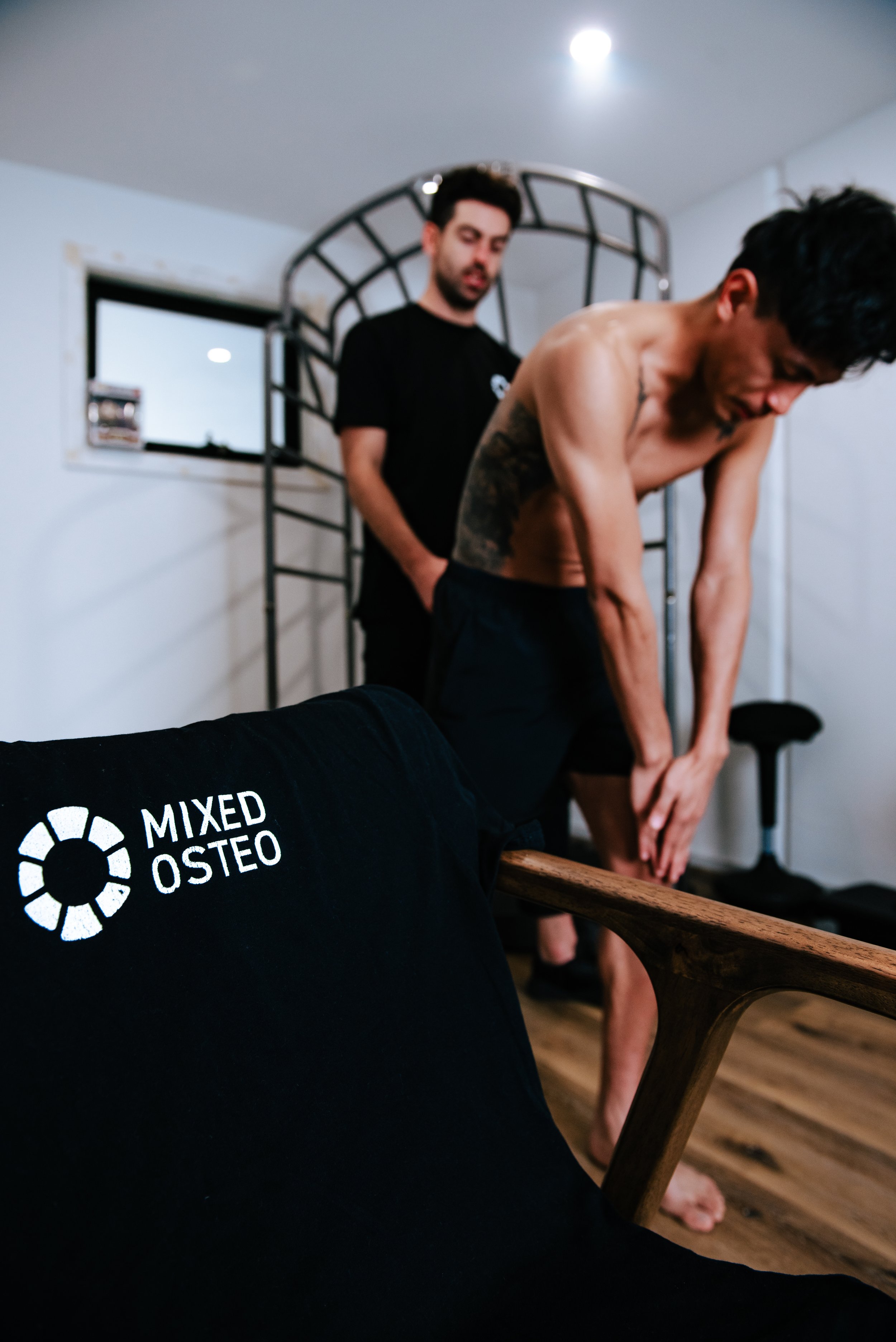Defending Your Back: How Osteopathy, AFS, and Exercise Rehab at Mixed Osteo Can Help Prevent and Treat Common Back Injuries in BJJ
Brazilian Jiu-Jitsu (BJJ) is a thrilling sport, but it can take a toll on your body, especially your back. Whether you're an experienced practitioner or just starting, the risk of back injuries is ever-present. But fret not, because at Mixed Osteo, we've got your back – literally! In this blog post, we'll explore the most common back injuries in BJJ and reveal how our expert team, armed with Osteopathy, Advanced Functional Synergy (AFS) techniques, and tailored exercise rehab, can help you conquer these challenges.
Common BJJ-Related Back Injuries
BJJ places significant stress on the back, making it susceptible to specific injuries. Here are some of the most common ones:
1. Muscle Strains:
Description: Muscle strains in the back often result from overexertion or improper technique during training or sparring sessions. The muscles that run along your spine can become strained, leading to pain and discomfort.
Symptoms: Muscle strain symptoms include localised pain, muscle stiffness, and limited range of motion. In severe cases, there may be muscle spasms.
Treatment: Osteopathic techniques can help alleviate pain and tension in strained muscles. Gentle manipulation and stretching can promote healing and restore muscle function. Exercise rehab will also focus on strengthening and stabilising these muscles to prevent future strains.
2. Herniated Discs:
Description: A herniated disc, also known as a slipped or ruptured disc, occurs when the soft inner core of a spinal disc pushes through its tough outer shell. BJJ's twisting and grappling motions can put immense pressure on these discs.
Symptoms: Symptoms may include sharp, shooting pain in the back, radiating pain down the leg (sciatica), numbness, tingling, and muscle weakness.
Treatment: Osteopathic care can help relieve the pressure on the affected disc by manipulating the spine gently. AFS techniques aim to correct movement imbalances that may have contributed to the herniation. Exercise rehab focuses on strengthening the core and back muscles to provide better support to the spine.
3. Facet Joint Injuries:
Description: Facet joints are small, paired joints that help stabilise the spine and control movement. Injuries to these joints can occur during intense training or sparring.
Symptoms: Facet joint injuries can cause localised pain and stiffness in the affected area. Movement may be restricted.
Treatment: Osteopathic techniques can help restore joint mobility and alleviate pain in the facet joints. AFS focuses on improving movement patterns to reduce the risk of further injury. Exercise rehab may include targeted exercises to enhance facet joint stability.
4. Sciatica:
Description: Sciatica occurs when pressure is applied to the sciatic nerve, often due to a herniated disc or muscle inflammation. The intense pain can radiate down the leg.
Symptoms: Besides severe back pain, sciatica can cause numbness, tingling, and weakness in the leg.
Treatment: Osteopathic care can help alleviate pressure on the sciatic nerve, reducing pain and discomfort. AFS can address imbalances that may have contributed to the condition. Exercise rehab focuses on strengthening the muscles that support the spine and improving posture to relieve pressure on the nerve.
5. Sprains and Ligament Tears:
Description: Sudden movements or twisting motions can lead to sprains or tears in the ligaments of the back.
Symptoms: Symptoms include localised pain, swelling, and limited range of motion in the affected area.
Treatment: Osteopathic techniques can promote healing by improving blood flow and tissue function. AFS aims to correct movement patterns that may have contributed to the injury. Exercise rehab includes strengthening exercises to support the injured area and prevent future sprains or tears.
Mixed Osteo's Holistic Approach:
Our team at Mixed Osteo offers a holistic approach to combat these injuries and keep you on the mat:
Osteopathy: Our skilled Osteopaths use hands-on techniques to assess and treat back injuries. They'll help restore joint mobility, reduce pain, and optimize tissue function, expediting your recovery.
Applied Functional Science (AFS): AFS techniques analyse movement patterns to identify imbalances that contribute to injuries. By correcting these imbalances, AFS not only accelerates healing but also enhances your overall performance.
Exercise Rehab: We don't just treat injuries; we focus on preventing them. Our tailored exercise programs target strengthening the muscles that support your back and improving your overall flexibility, stability, and strength.
Preventing Future Injuries:
Our goal isn't just to get you back in action; it's to keep you there. By honing your movement patterns, building strength, and fostering spinal health, our treatments not only aid recovery but also empower you to excel in BJJ without recurring injuries.
Join the Mixed Osteo Family:
Whether you're a seasoned BJJ practitioner or just beginning your journey, Mixed Osteo is your partner in achieving your grappling goals. Our multidisciplinary approach ensures you receive personalised care that aligns with your unique needs and aspirations. Don't let back injuries hold you back; experience the difference Mixed Osteo can make in your BJJ journey.
Ready to take control of your BJJ experience? Contact us today to schedule a consultation, and let's work together to keep your back strong and injury-free on and off the mats.
Level up your BJJ journey with Mixed Osteo - Book your appointment online now!


